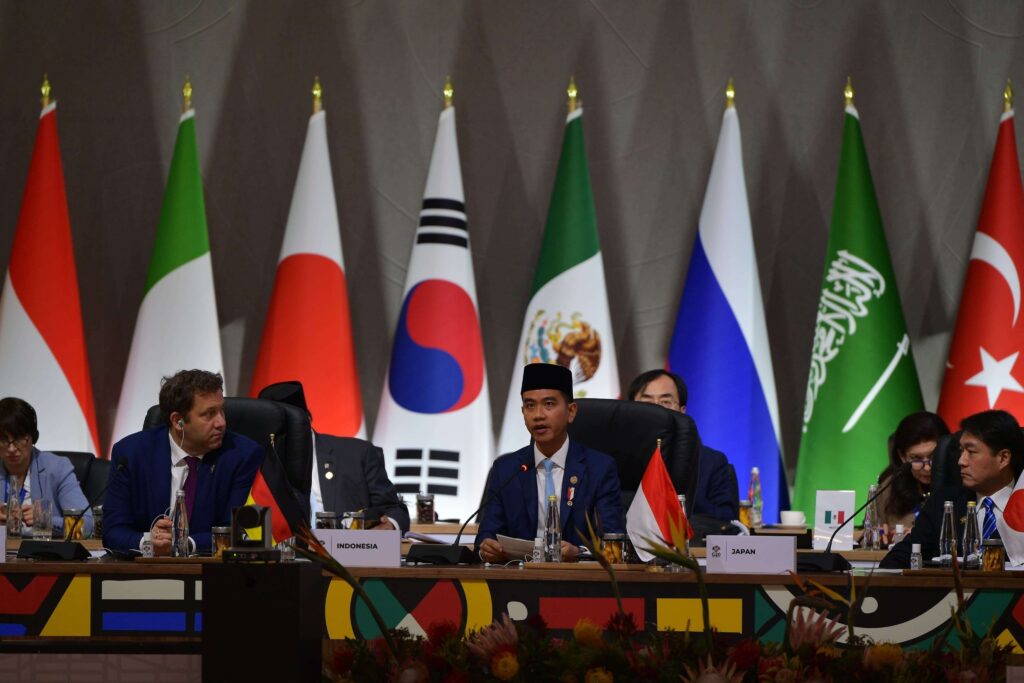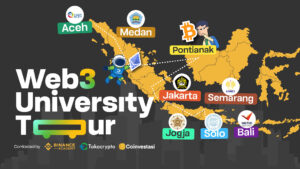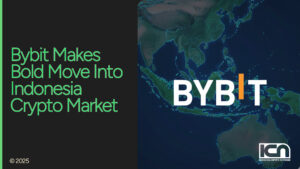Indonesia’s Vice President Gibran Rakabuming Raka has formally urged G-20 nations to begin a coordinated global dialogue on crypto assets and digital tokens—one of the country’s strongest signals yet that digital assets are becoming a strategic component of its long-term economic agenda.

Speaking at the G-20 Leaders’ Summit in Johannesburg, Gibran stated, ” New technologies such as crypto assets and digital tokens, including Bitcoin, bring both opportunities and risks. This is why Indonesia is proposing that the G-20 begin a dialogue on the intelligence economy.”
His remarks reflect a broader shift in how Indonesia views digital assets. Crypto and digital tokens are no longer niche financial instruments; they are increasingly intertwined with the evolution of the intelligence economy a phase where data, digital innovation, and programmable assets play a growing role in cross-border economic activity.
Calling for Global Coordination While Recognizing Local Realities
Gibran highlighted that crypto is already used widely across multiple countries and is becoming part of cross-border economic behavior. This is precisely why Indonesia is encouraging the G-20 to create a structured dialogue that covers regulatory direction, consumer protection, and the economic potential of digital assets.
At the same time, he emphasized an important principle: no two countries have the same digital landscape. Infrastructure, financial inclusion levels, and adoption patterns differ significantly. A single global regulatory template is unlikely to work. But coordinated dialogue is necessary to reduce misuse, close regulatory gaps, and ensure that innovation does not outpace governance.
This balanced posture aligns with Indonesia’s broader digital transformation strategy—welcoming innovation while ensuring the stability and security required for long-term industry development.
Gibran also pointed to the importance of digital infrastructure in supporting adoption. Citing QRIS the national QR payment system that has expanded digital financial access for millions he underscored Indonesia’s ability to scale new technologies quickly and inclusively. That same readiness forms a foundation for future digital-asset progress.
Read more: Indonesia–Singapore Deepen FinTech & Digital Asset Ties with New MoU
A Stronger Voice from the Global South
The Vice President also acknowledged the significance of South Africa hosting the G-20 Summit the first ever held on the African continent. He noted that this marks a broader change: countries across the Global South are becoming active contributors in shaping global digital-economy policy rather than simply following decisions set elsewhere.
Indonesia sees itself as part of this momentum. By urging the G-20 to begin a global crypto dialogue, the country is signalling its intention to ensure that digital assets develop in a way that is safe, inclusive, and beneficial to broader society.
Read more: Why Indonesia Matters for Crypto Brand Growth 2026
Assess Your Web3 Market Fit in Indonesia
For Web3 builders, infrastructure providers, tokenization platforms, and digital-asset service providers, this creates an important opening. Indonesia is aligning political will, regulatory intent, and accelerating adoption offering a high-potential environment for strategic market entry, partnerships, and long-term ecosystem growth.
Indonesia’s stronger stance at the G-20 reflects more than diplomatic intent it shows that digital assets are becoming part of the country’s long-term economic direction. For global Web3 companies, this shift opens a window to understand where their products naturally align within Indonesia’s fast-evolving environment.
If you’re exploring the market or assessing expansion potential, ICN provides a structured way to gauge your readiness across regulation, distribution, and partner landscape.
Take our free 2-minute Indonesia Market Assessment to identify how your offering fits into Indonesia’s digital-asset trajectory and where the strongest opportunities lie.




